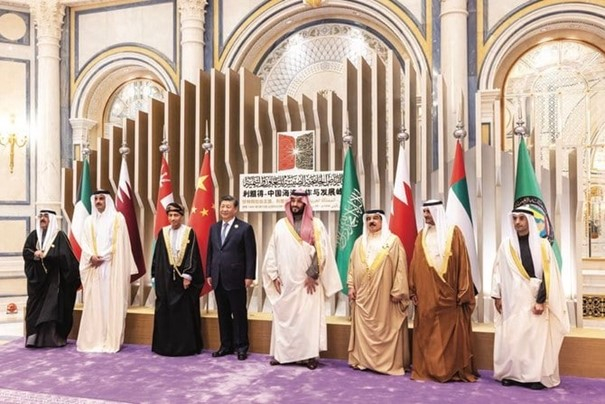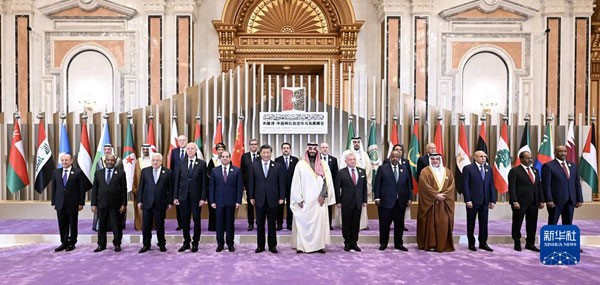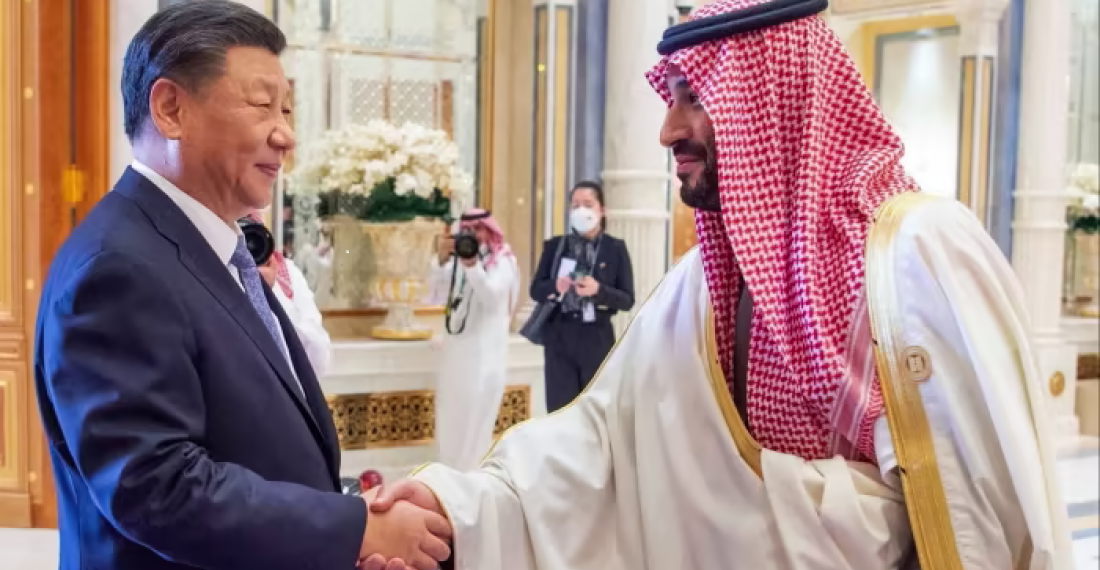It appears that the principles of the free market now dominate the international system, not only in areas of trade, but also in defence, security and foreign policy, writes Dennis Sammut in today's Monday Commentary on commonspace.eu. Bigger countries are wooing smaller countries, unashamedly displaying their goods, and dismissing those of others. China’s president Xi was in Saudi Arabia last week, to seal China’s new partnership with the Arabs. This week, it will Joe Biden’s turn to host African leaders at the White House.
"For the moment small countries are making the most out of this new free market atmosphere in the international system. But they must also keep in mind that, as in the market, demand sometimes slumps abruptly. It is at this point countries will not need just customers, but also friends."
China’s president Xi travelled to Saudi Arabia last week for a short but highly symbolic visit during which he not only held summits with the Kingdom’s leadership, but also, separately with the leaders of the six GCC countries and the leaders of the member states of the Arab League. Thus, Xi hoped with one trip to seal the relationship between his country and the Arab world, which have of course existed for some time, but which now appear to be entering a new strategic phase.
The choreography was impeccable. The Saudi leadership laid out the red carpet, with a few additional extras to show how highly the visit was appreciated. The Saudi Air Force – US trained and supplied – escorted the presidential plane as it approached Riyadh, whilst Saudi cavalry escorted the Chinese leader to the Royal Palace. King Salman was on hand to meet President Xi, although the subsequent talks were held with Crown Prince Mohamed bin Salman.
Xi’s various speeches in Riyadh, and the communiques subsequently issued after the tree sets of talks make for some fascinating reading and provide an indication of Chinese ambitions, as well as the readiness of the Arab counterparts to respond to these ambitions. They outline detailed plans for going forward, with well defined short term timeframes: 3-5 years in the case of the GCC; 5-8 years in the case of the Arab League states.
Chinese-Saudi relations reach new heights
Saudi Arabia and China vowed to prioritize relations as part of their foreign policy and set a model of cooperation and solidarity for developing countries, according to a joint statement released by both parties after the Saudi-Chinese summit.
The two sides reaffirmed they will continue to firmly support each other’s core interests, support each other in maintaining their sovereignty and territorial integrity, and exert joint efforts to defend the principle of non-interference in the internal affairs of states, rules of international law and basic principles of international relations. The Saudi side reaffirmed its adherence to the one-China principle, the Saudi state news agency SPA reported.
The joint final communique was surprisingly long and detailed and gives an indication of the ambition going forward. Apart from the formal communique, China and Saudi Arabia signed 12 agreements and government memoranda of understanding for cooperation in the fields of hydrogen energy, the judiciary field, Chinese language education, housing, direct investment, radio and television, digital economy, economic development, standardization, news coverage, tax administration, and anti-corruption. In addition, 9 agreements and memoranda of understanding between the government and private sectors, and 25 agreements and memoranda of understanding between private companies were also signed during the visit.
Communist Xi tells the leaders of the Gulf monarchies they are natural partners
Next came the summit between the Chinese leader, and the leaders of the six GCC countries who had gathered in Riyadh for the occasion. Apart from the Saudi Crown Prince, among those present were the Emir of Qatar and the King of Bahrain and senior members of the leaderships of Kuwait, UAE and Oman.
It was somewhat ironic when Xi, leader of the world’s largest communist country, told the leaders of the few remaining absolute monarchies that “China and the GCC were natural partners due to their shared values and interests”.
Xi said his country will work with the GCC over the next three to five years across five priority areas, including energy, investment, the digital economy, space, and cooperation in culture and language, with plans to teach the Chinese language in 300 schools and universities.

Xi tells the Arabs China and the Arab states should stay independent and defend their common interests.
On Friday, it was the turn of the Arab League, for the first China-Arab States Summit which announced that China and the Arab States agreed to make all-out efforts to build a China-Arab community with a shared future in the new era.
21 Arab League states attended, including President Abdel Fattah Al-Sisi of Egypt, King Abdullah of Jordan and President Kais Saied of Tunisia.
In his speech at this summit President Xi pointed out that China and Arab states enjoy a long history of friendly exchanges. The two sides have come to know and befriend each other through the ancient Silk Road, shared weal and woe in their respective struggles for national liberation, conducted win-win cooperation in the tide of economic globalization, and upheld fairness and justice in the changing international environment.
President Xi underscored that the world today is in a new period of turbulence and transformation. The Middle East is undergoing new and profound changes. The aspiration of the Arab people for peace and development is much more compelling, and their call for equity and justice is stronger than ever. As strategic partners, China and Arab states should carry forward the spirit of China-Arab friendship, strengthen solidarity and cooperation, and foster a closer China-Arab community with a shared future, so as to deliver greater benefits to the peoples and advance the cause of human progress.
China and Arab states should stay independent and defend their common interests. China supports Arab states in independently exploring development paths suited to their national conditions and holding their future firmly in their own hands. China is ready to deepen strategic mutual trust with Arab states, and firmly support each other in safeguarding sovereignty, territorial integrity and national dignity. The two sides should jointly uphold the principle of non-interference in other countries’ internal affairs, practice true multilateralism, and defend the legitimate rights and interests of developing countries.

A new multipolarity based on convenience
In essence, if you squeeze out the diplomatic niceties, what Xi told the Arabs was that China was ready to give them an alternative to the west; it was ready to understand their peculiarities, and tolerate them.
This is the new characteristic of the emerging multipolar world, one where the divide is not ideological, as during the cold war, but based on convenience. China, it seems, has unleashed market forces unto the international system. Of course, the Arabs are tempted, and why shouldn’t they? The west’s relationship with the Arab world has a chequered history. The baggage of the colonial era still has resonance in many Arab countries, and even in those where it doesn’t there is too much unpleasantness spoiling the relations.
There is, in the Arab world, widespread frustration with relations with Western countries. In the past, these frustrations were related mainly to US and European support for Israel and lack of empathy with the Palestinian people. These days this is much less an issue. Today’s problems are more related to the interests of the individual Arab countries, and often to western reluctance to support their ambition. Xi’s message to the Arabs – couched in diplomatic language – was that they do not need the West anymore. China could offer the same, and better, in practically all fields.
Arabs are frustrated with European attitudes
The Arabs frustration with the west could be heard on Saturday when Anwar Gargash, a senior advisor to the President of the United Arab Emirates, told an international conference in Abu Dhabi that it was encouraging to see greater European outreach to Gulf Arab states in the wake of the Ukraine conflict and energy crunch, but that engagement should not be “transactional.”
“What we’re hearing, especially from the Germans and others, about reengaging with the Gulf, I am encouraged but I would warn that it should not be transactional,” Anwar Gargash, the diplomatic adviser to the president of the UAE, told the World Policy Conference in Abu Dhabi.
Gargash reiterated a call for “explicit” security assurances from traditional Western allies, especially in dealing with the threat from Iranian drones that Gulf states have long warned about. It was not until these weapons “made it into the Ukraine theatre” that they were “catapulted” into the spotlight, and “suddenly the world rediscovered this issue,” Gargash said.
Gargash said some countries, which he did not name, were loading ties with “moralistic baggage and other interests,” adding politics has to be “more realistic if you want results.”
European need to start learning afresh how to deal with the Arabs
The international system does not like vacuums. Any vacuum left by one player is quickly filled by another. When the US started talking about its strategic rebalancing away from the Middle East to the Asia-Pacific region, it forgot to ensure that any vacuum it left would be filled by other similar minded players. Clearly it should have been the European Union that filled this vacuum. It did show interest and there has been some movement, but it is not enough and the process is moving too slowly
Europeans have for long treated Arab countries, but particularly Gulf states, as commodity suppliers, to be visited when the commodity is needed, to be forgotten once it isn’t. Gargash’s criticism of the transactional approach is being repeated these days right across the Gulf. Given that now the Chinese are also omni present, even the transactional approach is unlikely to work going forward.
Europe continues to insist on engaging the Arab world from the moral high ground. Most Arabs, be they in the governments, or in the proverbial Arab street, don’t accept this. The question arises, even if Europe strongly believes it its values, which it should – even if it does not always practice them, to what extent should it push these values down the throats of countries that are resisting them, and at what point does the whole exercise become counterproductive.
In Riyadh last week China’s president could not have been clearer that China will be different, and will accept Arab countries as they are. So even if Europeans are acting with the best motives and intentions, they still need to act tactfully, or pay the price. Many changes and reforms are needed in the Arab world, but sustainable change should come from within. Outsiders need to inspire by their example and their own success.
China's limitations
That is not to say that relations between China and the Arabs will now move seamlessly according to the grand design outlined by the Chinese president in Riyadh last week. Xi is now back in Beijing, and the Arabs will soon understand that behind the Chinese sweet words are realities that often are very different. In Africa, those countries that have been involved with the grandiose Chinese Belt and Road initiative have their own story to tell. China’s ability to deliver on many fronts, is weak compared to Europe and North America, and China remains a strategic partner of Iran, with all the implications of that, especially for the Gulf Arabs.
China on its part, knows also well enough that the Arabs are far from being one united bloc. Arab solidarity tends to evaporate very quickly, and China will have to negotiate with each country separately if it wants any tangible results.
Free Market principles in foreign affairs
However, no doubt, even when all these calculations are taken into account, international relations will in the future be determined by the dynamic forces of the market, that now are not limited to trade, but are also evident in areas of defence, security and foreign policy. It was these new free market principles in foreign affairs that were on display in Riyadh last week during the visit of the Chinese leader.
But to be fair, it is not only the Chinese who are at it. Joe Biden in the next days will host African leaders in the White House for another exercise in diplomatic charm offensive. White House officials this weekend strenuously denied that the summit had anything to do with Russian and Chinese increasing influence in Africa. This is all about Africa, White House officials insisted, adding that “major deliverables and initiatives” will be announced throughout the days of the summit.
For the moment small countries are making the most out of this new free market atmosphere in the international system. But they must also keep in mind that, as in the market, demand sometimes slumps abruptly. It is at this point countries will not need just customers, but also friends.
Source: Dr Dennis Sammut is Managing Editor of commonspace.eu and Director of LINKS Europe based in The Hague. He writes regularly on European and international security issues, the EU’s policy and strategy towards its neighbourhood and Gulf affairs. (director@links-europe.eu).
photo: Crown Prince Mohammed bin Salman welcoming Presidnet Xi of China in Riyadh on 9 December 2022 (picture courtesy of the Saudi Press Agency).
Monday Commentary is a personal opinion, and does not necessarily reflect the views of commonspace.eu or its partners and supporters







